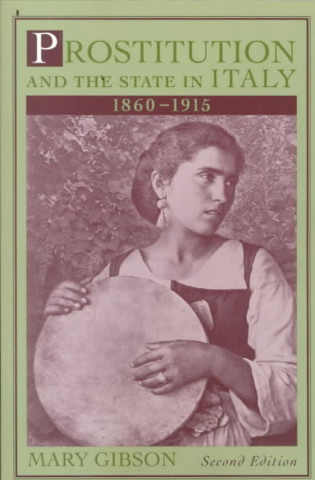
Code: 11536874
Prostitution State: Italy 1860-1950
by Mary Gibson
Prostitution and the State in Italy traces the history, of prostitution from unification in 1860 to 1915. The Cavour Law of 1860 regulating prostitution was named after Camillo Benso di Cavour, the first prime minister of Italy. C ... more
- Language:
 English
English - Binding: Paperback
- Number of pages: 288
Publisher: Ohio State Univ Pr, 2000
- More about this

40.35 €

Low in stock at our supplier
Shipping in 10 - 14 days
Potřebujete více kusů?Máte-li zájem o více kusů, prověřte, prosím, nejprve dostupnost titulu na naši zákaznické podpoře.
Add to wishlist
You might also like
-

Threnody for Sturgeon and Selected Stories
18.81 € -17 % -

Touching the Rock
12.37 € -18 % -

Way Down Deep in the Deep Blue Sea
15.19 € -24 % -

Helene Cixous -OS
23.54 € -

The Hole We're in
14.98 € -4 % -

Praying with My Eyes Wide Open
16.49 € -4 % -

Two, Four, Six, Eight, When You Gonna Integrate?
18.81 € -17 %
Give this book as a present today
- Order book and choose Gift Order.
- We will send you book gift voucher at once. You can give it out to anyone.
- Book will be send to donee, nothing more to care about.
More about Prostitution State: Italy 1860-1950
You get 101 loyalty points
 Book synopsis
Book synopsis
Prostitution and the State in Italy traces the history, of prostitution from unification in 1860 to 1915. The Cavour Law of 1860 regulating prostitution was named after Camillo Benso di Cavour, the first prime minister of Italy. Cavour feared the spread of renewal disease into Italian society by soldiers fighting for unification and thus introduced measures he thought would serve as a means of protecting the public. Once peace returned, the laws were retained, since many agreed that they were necessary to insure health, order, and morality.The law required all prostitutes to register with the police, live in licensed brothels, undergo biweekly health examinations, and be treated in a special hospital if they became infected with venereal disease. This strictly regulated system produced numerous records, which Mary Gibson has used to examine how the laws affected the lives of women engaged in the trade. Gibson builds social profiles of individuals prostitutes that include level of education, marital status, age, and former occupation. Why the Italian government instituted regulation and why the policy persisted in spite of evidence of its falings are questions she addresses.Early feminists and some democrats protested the laws as being unjust and promoting inequality of the sexes. Twenty-eight years after the law was passed, in 1888, challengers succeeded in getting it liberalized, but their triumph lasted only three years. In 1891 regulation returned and stayed in place until 1958, when the laws were finally overturned. Italy was not alone in formulating new legislation to control prostitution, but it was one of the last of the modern European nations to deregulate it.
 Book details
Book details
40.35 €
- Full title: Prostitution State: Italy 1860-1950
- Author: Mary Gibson
- Language:
 English
English - Binding: Paperback
- Number of pages: 288
- EAN: 9780814250488
- ISBN: 0814250483
- ID: 11536874
- Publisher: Ohio State Univ Pr
- Weight: 386 g
- Dimensions: 230 × 152 × 16 mm
- Date of publishing: March 2000
Trending among others
-

Berserk Deluxe Volume 1
47.99 € -28 % -

Cry Baby Coloring Book
9.85 € -12 % -

Berserk Deluxe Volume 2
52.22 € -

Haunting Adeline
30.78 € -

Hunting Adeline
31.79 € -

Reckless
10.25 € -20 % -

Powerless
11.97 € -6 % -

The Official Stardew Valley Cookbook
21.83 € -24 % -

Berserk Deluxe Volume 4
46.58 € -7 % -

White Nights
3.51 € -

Berserk Deluxe Volume 3
48.90 € -2 % -

Berserk Deluxe Volume 5
50.51 € -

Gravity Falls Journal 3
18.31 € -13 % -

BALLAD OF SWORD & WINE QIANG JIN JIU V01
17 € -18 % -

Atomic Habits
16.19 € -29 % -

Iron Flame
16.19 € -24 % -

Chainsaw Man, Vol. 15
10.36 € -19 % -

No Longer Human
13.48 € -16 % -

JUJUTSU KAISEN V22
9.55 € -28 % -

The 48 Laws of Power
24.55 € -8 % -

Surrounded by Idiots
10.76 € -9 % -

Twisted Lies
9.75 € -17 % -

Berserk Deluxe Volume 6
51.11 € -

Court of Thorns and Roses Paperback Box Set (5 books)
50.11 € -19 % -

Everything I Know About Love
10.36 € -29 % -

Once Upon A Broken Heart
9.85 € -23 % -

Twisted Games
9.75 € -24 % -

Heaven Official's Blessing: Tian Guan Ci Fu (Novel) Vol. 1
18.10 € -8 % -

Fourth Wing
10.25 € -20 % -

Twisted Love
9.75 € -24 % -

A Little Life
17.50 € -

Dungeons & Dragons Essentials Kit (D&d Boxed Set)
22.73 € -12 % -

Berserk Deluxe Volume 10
58.76 € -

Don't Believe Everything You Think
12.87 € -20 % -

The Courage To Be Disliked
11.06 € -6 % -

Harry Potter and the Prisoner of Azkaban (Minalima Edition)
30.78 € -23 % -

Court of Thorns and Roses
9.25 € -21 % -

Bungo Stray Dogs, Vol. 8 (light novel)
16.59 € -2 % -

Golden Terrace: Volume 2
13.98 € -33 % -

Golden Terrace: Volume 1
15.89 € -24 % -

Bridgerton: The Duke and I
10.15 € -29 % -

Howl's Moving Castle
8.04 € -26 % -

Heaven Official's Blessing: Tian Guan Ci Fu (Novel) Vol. 5
17.40 € -12 % -

Twisted Hate
10.15 € -20 % -

Berserk Deluxe Volume 7
48.09 € -4 % -

Court of Mist and Fury
9.95 € -16 % -

Percy Jackson and the Olympians 5 Book Paperback Boxed Set
36.42 € -19 % -

Berserk Deluxe Volume 8
51.21 € -

The Husky and His White Cat Shizun: Erha He Ta de Bai Mao Shizun (Novel) Vol. 5
20.22 € -1 %
Collection points Bratislava a 2642 dalších
Copyright ©2008-24 najlacnejsie-knihy.sk All rights reservedPrivacyCookies


 15549 collection points
15549 collection points Delivery 2.99 €
Delivery 2.99 € 02/210 210 99 (8-15.30h)
02/210 210 99 (8-15.30h)